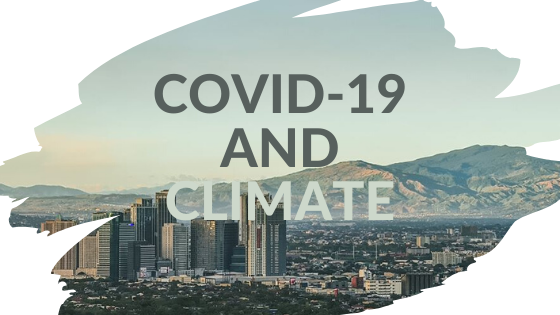Governments around the world have enforced lockdowns in a bid to curb the spread of COVID-19. With people “shut in” and no longer allowed to travel whether land or air, a significant decrease in carbon emissions is being reported across the planet. Locally, a study conducted by the University of the Philippines Diliman reports a decrease of nitrogen dioxide (NO2) in Metro Manila cities since the implementation of the enhanced community quarantine (ECQ). Nitrogen dioxide is a greenhouse gas that comes from burning fuel, i.e., emissions from cars, trucks and buses, power plants, and off-road equipment.
Read also: COVID-19 Situation Gives Rise To A New Kind Of #OneAboitiz

Seeing it this way might lead us to ask, “Is the COVID-19 pandemic healing the Earth?” The question is largely debatable, but scientific organizations such as the World Meteorological Organization (WMO) are being conservative, opting to say that whatever positive effects the pandemic has had on carbon emissions are still marginal.
Indeed, as the world’s attention is locked on the unprecedented health crisis, there is no denying that climate change remains a looming concern. Linking the two greatest challenges of the present time, Karolina Zubel from the Center for Social and Economic Research, shares that the approaches towards the COVID-19 outbreak could be useful in tackling climate change through the following:
1. Increase trust in science.
This health crisis has proven that not all heroes wear capes. Medical professionals are now given more attention to as their expertise is vital and essential in crafting evidence-based policies. Zubel notes that such trust should also increase in addressing climate change.
2. Regard climate change as a global health crisis.
The difference between these global health emergencies is that “the impact of the virus has been sudden and dramatic”, while climate change is “old, slow, and steady”. However, there are far more millions of deaths due to air pollution, and that change in temperatures contribute to many more common and dangerous diseases (dengue, malaria, haemorrhagic fever, and Zika virus).
3. Take firm and immediate action.
In a research done by a Hong Kong-based venture capital, countries like Israel, Germany, and South Korea are considered role models in managing the COVID-19 outbreak. The criteria includes quarantine efficiency, government management efficiency, monitoring and detection, and emergency treatment readiness.
Quick and prepared — same needs to be done to prevent future worst-case climate scenarios.
4. Apply “people first” approach.
Both the government and private sectors have shifted their focus on people, particularly the frontliners.
All this shows that a large-scale people-centred approach to a global crisis is possible. Such a compassion and proactive approach in taking care of those most vulnerable should also be addressed to those most exposed to climate and environmental externalities.
– Karolina Zubel, Center for Social and Economic Research
5. Boost green investments.
Zubel cited Germany as an example, which unleashed several billions of Euros for its stimulus package to cushion the country’s economic impact. The amount is said to almost match the expenditure on the entire EU Green Deal.
In the Philippines, the Bangko Sentral ng Pilipinas (BSP) recently issued a circular “to incorporate environmental, social, and governance (ESG) and sustainability principles into their corporate strategy, risk management, and bank operations framework”. Banks are required to submit a transition plan integrating sustainability principles before the end of the year or six months from the effectivity of the circular.
Sustainable finance is defined as “any form of financial product or service which integrates environmental, social and governance criteria into business decisions that supports economic growth and provides lasting benefit for both clients and society while reducing pressures on the environment.” This also includes green finance which funds green economic activities and climate change mitigation and adaptation projects.
6. Shift to a new way of thinking and revolutionize the culture.
With the implementation of physical distancing, the inclusion of such constraints prompted people to act the “new normal”. Zubal regarded this cultural change as “no less important than technological investments.”
Climate change has been on the scientific agenda for much longer than the COVID-19 outbreak, and tools to fight it are already in place; what we need at this stage is the political and social will to apply them.
Organizations can take up the above lessons in decision-making toward a sustainable future by continuously improving ESG practices and managing emerging risks brought about by the pandemic to be able to adapt in this “new normal”.
Prioritizing climate change at this time may be challenging but sustainability remains an integral part of Aboitiz’s business strategy, particularly, when decisions look beyond immediate consequences and aim to balance the interests of people, planet, and profit.
Earlier this year, Aboitiz Equity Ventures became the first Philippine private company to join the Task Force on Climate Related Financial Disclosures (TCFD). The TCFD is comprised of international supporter organizations and aims to develop recommendations to measure and respond to climate change risks, and encourage firms to align their disclosures with investors’ needs.
In many ways, the COVID-19 pandemic acts as a litmus test on how mankind — wired to either fight or flight — chooses to respond to a crisis. The events are still unfolding but, already, we are seeing how a unified approach (e.g. less cars on the road) has the potential to reverse damage on a global scale, albeit inadvertently.
Featured photo by Johair Siscar Addang


